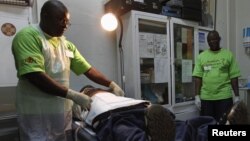HARARE, Zimbabwe — The U.S. government has pledged an additional $39 million to fight AIDS in cash-strapped Zimbabwe, bringing its total contribution to nearly $100 million. The funds come through the President's Emergency Plan for AIDS Relief, known as PEPFAR.
Announcing the increase in PEPFAR funding this week, outgoing U.S. Ambassador to Zimbabwe Charles Ray said that with the new U.S. support, non-governmental organizations now will supply anti-retroviral medication to 140,000 HIV-positive patients.
"We will be looking [at] an increase of about $15 million in the area of voluntary medical circumcision, which is a proven safe and effective intervention measure for HIV prevention," said Jillian Bonnardeaux, acting U.S. spokeswoman in Harare while describing how the new PEPFAR funds will be used. "We will see $18.6 million to allow the government of Zimbabwe to increase anti-retroviral medications and the third area is toward accelerating the prevention of mother-to-child transmission."
Male circumcision
According to U.N. figures, Zimbabwe has about 1.2 million people living with the HIV virus. The country is already familiar with anti-retroviral medications and the concept of preventing mother-to-child transmission. But the idea of male circumcision appears to be getting some resistance.
Since June, when some members of parliament underwent voluntary medical circumcision, the Zimbabwean media has been downplaying the effectiveness of the method. Media reports say circumcision is a dangerous distraction in the fight against HIV/AIDS, claiming the procedure only reduces female-to-male HIV transmission rates by no more than 1.3 percent.
The U.N. World Health Organization WHO, however, says male circumcision reduces female-to-male HIV transmission by up to 60 percent.
Progress
Bonnardeaux said the negative perception will disappear in time.
"I think anything that is new deserves a closer look. This male circumcision is something that has been proved safe and effective. We need to look at the science behind it. I think part of it is our job and part of it is the job of the Zimbabweans of how it can be effective here," said Bonnardeaux.
Zimbabwe journalist Tinashe Farawo was circumcised last month. He endorses all three initiatives to achieve what the Obama administration has called an "AIDS-Free Generation." That includes male circumcision.
"People are dying because of this disease [HIV/AIDS]. But if people get circumcised and use all other methods: condomize, be faithful to their partners, getting tested, I think it will be OK because it was proved," said Farawo. "Of course, you still remain exposed because 60 percent is not 100 percent, so you are still at risk like anyone else."
HIV prevalence in Zimbabwe has dropped steadily during the past 15 years, falling from an estimated 26 percent in the late 1990s to about 14 percent today.
Announcing the increase in PEPFAR funding this week, outgoing U.S. Ambassador to Zimbabwe Charles Ray said that with the new U.S. support, non-governmental organizations now will supply anti-retroviral medication to 140,000 HIV-positive patients.
"We will be looking [at] an increase of about $15 million in the area of voluntary medical circumcision, which is a proven safe and effective intervention measure for HIV prevention," said Jillian Bonnardeaux, acting U.S. spokeswoman in Harare while describing how the new PEPFAR funds will be used. "We will see $18.6 million to allow the government of Zimbabwe to increase anti-retroviral medications and the third area is toward accelerating the prevention of mother-to-child transmission."
Male circumcision
According to U.N. figures, Zimbabwe has about 1.2 million people living with the HIV virus. The country is already familiar with anti-retroviral medications and the concept of preventing mother-to-child transmission. But the idea of male circumcision appears to be getting some resistance.
Since June, when some members of parliament underwent voluntary medical circumcision, the Zimbabwean media has been downplaying the effectiveness of the method. Media reports say circumcision is a dangerous distraction in the fight against HIV/AIDS, claiming the procedure only reduces female-to-male HIV transmission rates by no more than 1.3 percent.
The U.N. World Health Organization WHO, however, says male circumcision reduces female-to-male HIV transmission by up to 60 percent.
Progress
Bonnardeaux said the negative perception will disappear in time.
"I think anything that is new deserves a closer look. This male circumcision is something that has been proved safe and effective. We need to look at the science behind it. I think part of it is our job and part of it is the job of the Zimbabweans of how it can be effective here," said Bonnardeaux.
Zimbabwe journalist Tinashe Farawo was circumcised last month. He endorses all three initiatives to achieve what the Obama administration has called an "AIDS-Free Generation." That includes male circumcision.
"People are dying because of this disease [HIV/AIDS]. But if people get circumcised and use all other methods: condomize, be faithful to their partners, getting tested, I think it will be OK because it was proved," said Farawo. "Of course, you still remain exposed because 60 percent is not 100 percent, so you are still at risk like anyone else."
HIV prevalence in Zimbabwe has dropped steadily during the past 15 years, falling from an estimated 26 percent in the late 1990s to about 14 percent today.




